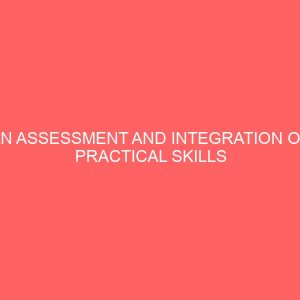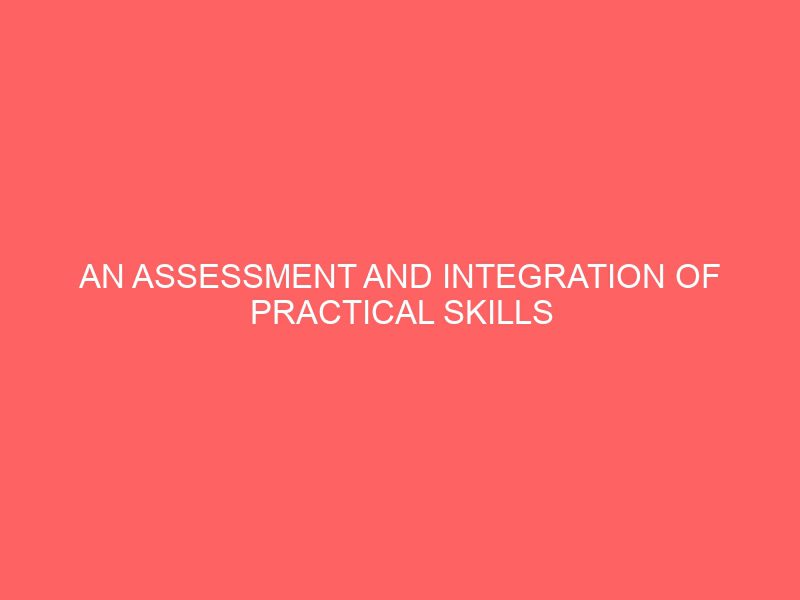Description
SECTION A
A1. INTRODUCTION
This project is on an assessment and integration of practical skills in teaching biology among secondary school teachers (a case study of warji local government area of bauchi state). Learning science involves investigation and measuring testable concepts. Laboratory work is the hallmark of science education. It requires skills in carrying out practical investigations regarding concepts like types of foods, or tissues and organs amongst others. A skill is a developed proficiency acquired through specialized training. The training is imparted to the students through practice over time. The Biology practical skills as well as coverage of the content ascribed in the curriculum are influenced by the teaching and learning undertaken in class. Globally, practical work has become a well-established part of secondary school science (Poppe and Markis, 2011). In fact, since 1988, the National Curriculum of England placed emphasis on practical’s (Wellington, 2002) and current science teaching involves students carrying out practical work as an entity of biology, chemistry and physics lessons. Since the 19th century practicals have been part of the science classes in the United States of America and European secondary schools. Practicals are of great significance in curriculum of any practical science such as Biology (Singer et al., 2005). Students claim to find practical work as an enjoyable and effective way of learning science (Hodson, 1993) and this has also been reported in many other studies (Osborne and Collins, 2001; Jenkins and Nelson, 2005). In Nigeria, since 1963, the Biology curriculum has gone through various revisions with each revision maintaining the emphasis on practical skills at both class and examination levels. In the School Science Project (SSP) syllabus, Biology was taught through heuristic approach consequently the students’ text books were more of work-books with brief explanations of concepts (Namuddu, 1989).
The term science has to do with nature; it is derived from the latin word scientia which mean knowledge. It is a systematic enterprise that builds and organizes knowledge in form of testable explanations and predictions about the universe. It can equally be defined as a field of study which tries to describe and understand nature of the universe in whole or part.
According to hyacinth(2004), science in its broad sense refers to all human activities involving organized knowledge of natural phenomena. It alsorefers to a system of acquiring knowledge to describe and explain natural phenomena
Science is a great enterprise which nations depend on, in order to advance technologically. Science therefore, is receiving much emphasis in education because of its significance and relevance to life and society.
Biology as a branch of science and prerequisite subject for many fields of learning. It contributes immensely to the Technological growth of every nation which include medicine and surgery, forestry, agriculture, biotechnology and nursing. The study of Biology in senior secondary school can equip students with useful concepts, principles and theories that will enable them face the challenges before and after graduating from secondary school.
Biology as one of the science subject is bent in making one to be conversant with the environment he/she lives in in order to appreciate the meaning of scientific life, to develop unbiased mind to serve as an ideal future citizen. Fortunately, it is a fact that biology is the commonly chosen science subject of most secondary students as confirmed by the West African Examination Counsel (WAEC).
Students who are not motivated will not learn effectively, they won’t be able to retain information, they won’t participate in the class and some may even develop phobia to the subject in question. A student may not feel motivated for a variety of reasons, among which are they may feel they have no interested in the subject which results from lack of motivation, or find the teacher’s method of teaching unengaging or maybe the student has difficulty in learning and thus need to be attended specially
In the absence of instructional materials and practical work as methods in teaching biology, motivating the students to develop interest in biology is a difficult task. Motivated students tend to be more excited to learn and participate in the class when the teacher is teaching biology.
Teaching biology in a class full of interested students, is by far more enjoyable for the teacher and the students. Though some student are motivated with a natural love for biology, but with the inclusion of practical work and the use of instructional materials in teaching biology, even the students who are less interested or at all not interested in biology, can be inspired by biology teachers to reach their full potential.
There are some effective ways to get the student excited by encouraging them to participate in the laboratory activities, getting them involved by using one of the students in the course of demonstration, by getting creative while teaching such as dissecting a flower with the class and asking the students to draw a diagram of the dissection, relating your teaching to real life by showing the class a liver, heart, intestines of an animal you dissect or by relating what you, the teacher taught with the students immediate environment such as trees, soil etc.
A2. Background to the Study
The goal of education in Nigeria is to promote economic, technological and industrial development for national good (Gacheri 2014). There is no much research conducted to show whether the youth are prepared scientifically to play effective and productive role in development of the nation. Industrial and technological developments in Nigeria will depend on skills, knowledge and expertise in science hence appropriate training in sciences is necessary as envisaged in vision 2020. Science is a great enterprise which nations depend on, in-order to advance technologically. Biology in senior secondary school can equip students with useful concepts, principles and theories. Science therefore, should receive much emphasis in education because of its significance and relevance to life and society (Chinwe, Chukele, 2008). Biology as a branch of science and the prerequisite subject for many fields of learning contributes immensely to the technological growth of the nation. This includes medicine, forestry, agriculture, biotechnology and nursing. The study enable them face the challenges before and after graduation. In any curriculum, science education is acknowledged as means of providing knowledge and skills for developing various spheres of life. Biology is one of the key sciences that play great role in developing technological skills. The process for effective learning in Biology is generally the case in other sciences which require a practical input. But the use of practical approach to teaching and learning in schools is on decline in the belief that it is time consuming as teachers rush to complete the syllabus. Development of practical process skills requires well equipped laboratories in schools and trained manpower. In Warji where research was conducted most schools lack laboratory facilities and trained lab technicians necessary in teaching science to develop process skills.
Development of practical process skills are important in acquisition of twenty first century skills which include technological development. It is on this background that this study attempted to establish the effect of practical learning and assessment on learner achievement in Biology in Nigerian schools, (Edison, 2004).
Biology knowledge is important to equip the learner with knowledge to apply, improve and maintain the health of the individual family and community. Biology syllabus recommends teaching through discussion on practical activities, field trips, demonstration and project . This encompasses theory and practical work. Shiundu , Omulando (1992) notes teaching methods or strategies currently recommended process-based approach of teaching to help students learn science process skills. These include laboratory work, field and project work. The curriculum developers in Nigeria advocate for learner-centered approaches in teaching of science in secondary schools (Nigeria Institute of Education 2006). But most teachers in schools still use traditional written approaches, whereas practical and projects are rarely used.
To achieve the vision 2020 in education, a number of initiatives have started to enhance practical teaching in schools as a pedagogy .This included equipping school laboratories through government funding. This study sought to establish the gap that could be filled through the practical integration in Biology. Assessment is defined as a direct measure of what has been learned as a result of instruction on specific objectives (Gagne, Briggs, Wagner,1988). It is a process of collecting data by measuring /testing which helps to give value judgment. Assessment comprise of two components: measurement and evaluation. Measurement is a systematic process of developing a quantitative and qualitative description of student performance (Erickson, Wentling, 1978). Evaluation is concerned with the worth of particular performance. Suggested assessment methods in biology are: Practical Work, Project work, Field trips, Oral questions,. Quizzes, written tests and examinations. Practical work should be essential constituent of school science. This is important as practical work encourages science process skills.
Practical assessment mostly deals with acquisition of practical science process skills. The biology practical skills are science process skills. They are taught as part of the biology curriculum. These skills can be acquired and developed through activities involved in the biology practical sessions. According to Maundu, Sambili and Muthwii (2005), one of the ways of assessing the objectives of teaching biology is through practical work. In practical work, an opportunity is provided for testing application of scientific procedures, manipulative abilities as well as scientific skills. The Nigeria National Examinations Council (NECO) makes use of practical examinations to test students’ acquisition of various biology practical skills which in essence are science process skills. In these examinations, students are required to carry out biology practical activities following some given instructions. The basic science process skills in biology include measuring, drawing, observation, classifying, manipulating, inferring/conclusion. Integrated skills include experimenting and interpreting (Owino, Indoshi , 2013 ).
A3. Statement of the Problem
Science is recognized for economic development and for citizens to acquire scientific literacy In African countries there is comparative dismal performance in science due to poor teaching styles and assessment. Vision 2020 aims at creating human base who are adaptive .This can be achieved through development of skilled man power in the field of medicine, pharmacy, agriculture and biotechnology Africa has huge potential in the field of agriculture but still suffers from hunger and diseases due underutilization of her landmass. The main problem is that Africa , Nigeria included has not developed specialized human resources to address this problem. Development of these skills requires biology background to pursue an advanced degree in these fields. There is need to improve performance in biology as perquisite to produce qualified personnel in the sub-county to address cited problems.
One of the measures to mitigate this problem is integration of practical process skills observation, experimenting, drawing and measurement during teaching and learning process. Hence the purpose of study was to find the impact of practical process skills observation experimenting, drawing and measurement on learner achievement in biology.
Biology is a very challenging subject which requires only well trained and intellectual teachers for its handling. Most of the available teachers are not competent enough to teach the subject .This makes it difficult for such teachers to give detail explanations about the required concepts. Also, poor mastery of the subject by the teacher causes students’ loss of interest in learning the subject. An intelligent and sound teacher with good mastery of his subject matter always commands respect and gains students’ attention during teaching learning process (Aggarwal, 2001). According to Agnes (2013) teachers with good professional competent and interpersonal skills are more effective in their classrooms in terms of students’ behavior, better understanding of concept by students and disposition of positive and mental alertness by learners.
Majority of biology teachers don’t see themselves as professionals who need special skills in problem solving techniques, critical and intellectual reasoning and decision making skills. Since impaction of knowledge is solely meant for who have skills, attitudes and values to impact on others, lack of these important skills by some social studies teachers prevent them from giving or teaching the students the right things required of them to teach.
A4. Purpose of Study
The purpose of study was to was to assess the integration of practical skills in teaching biology among secondary school teachers in Warji Local Government Area of Bauchi State.
A5. Objectives of the Study
The study strived to achieve the following objectives:
- To determine the impacts of laboratory practicals in teaching biology;
- To determine the observation skills in biology;
- To determine impact of exploratory laboratory method in teaching biology;
- To determine impact of inductive laboratory method in teaching biology;
A6. Significance of Study.
Solving problem of poor performance in public secondary schools particularly in biology in Warji and Nigeria as whole would be of great benefit to the subject and science in general. Country like Nigeria where science and technology is considered an integral part to achieving the millennium Development Goals (MDG) as indicated in the vision 2020 objectives. Policy makers will find the findings of this study of relevancy. This may influence teacher training especially area of pedagogy and ministry to strengthen quality assurance unit to oversee schools undertake practical teaching and assessment.
The Teachers Service Commission(TSC) whose mandate is to ensure effective service for quality teaching standards, could also find this study useful as it may serve as a source of information from schools about the use of practical learning in public secondary schools.
The findings of this study would significantly form basis to explain some basic truth to the State government and officials of Ministry of Education in taking the right decision on the provision of adequate training to aid teachers have skills in teaching and learning process.
It will help the respective Government/policy makers to take corrective measures within their jurisdiction through adequate planning of resources to meet the demands and guide their actions on future projects on the education of staff and students for successful teaching and learning skills in teaching practicals in the schools.
Finally, the findings of this study will serve as a foundation for future researchers to build their studies, thus it will add more information to the existing literature.
A7. Limitations of Study
The study is directed at assessing the integration of practical skills in teaching Biology among secondary school teachers in Warji Local Government Area of Bauchi State, Nigeria.
Due to time factor and financial constraints, it will not be possible to cover all the Schools in Warji Local Government Area. Some representative samples will be taken; this will provide the basis for conclusion, recommendation and perhaps possible generalization on the study area








Reviews
There are no reviews yet.